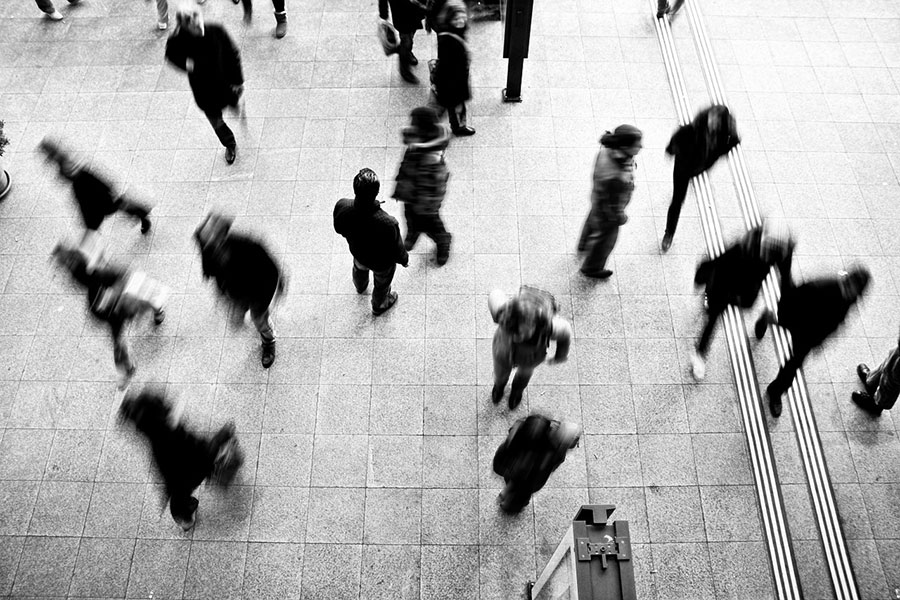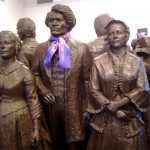This guest post was written by Darrell Lackey.

People need to be seen. People need to know they exist, that they matter. People need to know they have gravity, weight, that they bend space and time. It is a slow, quiet death when a person feels like no one can see them. Imagine knowing you exist, have feelings, dreams, and desires, but are treated like a ghost — you can see others, but they can’t (or won’t) see you.
A significant damaging effect of the fundamentalist (evangelical?) mindset is its tendency to make some people feel invisible. It happens in many ways, but here are just a few:
When we see people in a strict, black and white world of “saved” and “lost,” there is a tendency to dismiss the views, opinions, and feelings of those considered “lost.” Not only does this make them disappear, it reveals a pride, as if nothing could be learned from a “lost” person (Remember the Magi in Matthew 2?).
When we treat certain sins as more “sinful” than others, there is a tendency to treat the people who commit those “sins” in a way that makes them feel invisible. This is a paradox of sorts, because on one level they are actually made to feel more visible, exposed, shamed, and guilty, so there is also a sense of being paraded about — or being made very visible.
What this does, however, is make the people being shamed (for instance, gay people) want to shrink away, to hide, to become invisible. Think about it. Why do you think it is called coming out of the “closet?” The closet exists to hide in, to be invisible. We don’t want to “see” them. When they try and become visible to us (come out), to explain their views and their experience, just like with “lost” people we tend to dismiss their views and feelings. After all, how can a person who doesn’t recognize their own sin (which begs the question, but never mind), possibly share anything important or true? When people sense this is what the other person feels toward them, they begin to disappear.
When we are silent regarding, or even support, political bullies who use their power to put others down, to mock the handicapped, to treat women disrespectfully, to stir up the fear and hatred of others, to demonize immigrants and those with different religious views, it communicates to all those on the losing end of such arrangements that they are invisible to us—that all we can see, all we care about, is the powerful.
When we support a view, attitude, or action that leads an entire subset of people, whether women, immigrants, or people of color, to feel they are somehow less than White American Males, we make those people feel invisible.
When one of those groups of people, women, cannot teach authoritatively, preach, or hold certain offices/positions within our churches or society, we make women feel even more invisible.
When we are either unaware of, or indifferent to, a political/cultural system of consumerism, where the market and money become gods/idols, we enable a system that makes those who have less, those on the economic margins, the poor, to feel invisible.
It is very possible that many of us are not even aware that we are doing some of these things or that we are a part of these structures or attitudes. Before leaving fundamentalism, I wasn’t. Unfortunately, that doesn’t make anyone feel any less invisible. Instead, it adds insult to injury. Worse, it could be we are aware of and even supportive of these very systems, actions, or views that make others feel invisible. If so, shame on us. There is nothing “Christian” about wanting, or enabling, structures that lead others to feel invisible.
I love that Jesus saw the invisible people. Just like today, there were people then who were very visible. The Roman leaders and soldiers were very visible. The religious leaders, the Pharisees, and members of the Sanhedrin were very visible. Rich people were very visible. Sound familiar?
When Jesus was invited to a dinner with the very visible and powerful, this is what he told them:
“When you give a dinner or a banquet, do not invite your friends or your brothers or your relatives or rich neighbors, lest they also invite you in return and you be repaid. But when you give a feast, invite the poor, the crippled, the lame, the blind…” (Luke 14)
In other words, invite the invisible people — the people who can do nothing for you. But to invite, we first must see them.
Another example:
“When he saw the crowds, he had compassion for them, because they were harassed and helpless, like sheep without a shepherd.” (Matthew 9)
Jesus didn’t just see faces in a crowd. He saw the invisible in those crowds, those who were harassed and helpless.
Maybe the best example from Scripture of Jesus seeing the invisible people, is the woman at the well (John 4). This woman had three strikes against her. First, she was a woman. Second, she was a Samaritan, and third, she was considered an immoral woman because of her many marriages. She was about as invisible as one could get. She is shocked that Jesus even talks to her. I imagine her thinking, “He sees me.”
Jesus saw the invisible people. They registered with him; they appeared on his radar. Jesus notices even when an “unclean” (invisible) woman barely touched the hem of his garment (Matt 9). We read: “Jesus turned and saw her.” He saw her, even if those around her refused to.
Some questions we might ask ourselves:
Does the church I belong to see the invisible people?
Does the city, county, and state I live in see the invisible people?
Does my country?
My president?
Do I?
If the answer to any one of those is “No,” what will we do about it? We need to see the invisible people. Jesus did. Be like Jesus.
Photo via Pixabay.
 About Darrell Lackey
About Darrell Lackey
Darrell Lackey has been a lead pastor and currently works in the private sector. He is part of a home gathering of some amazing, wonderful Christians and a graduate of the University of San Francisco and Golden Gate Baptist Theological Seminary (Now Gateway). You can follow him or read more of his writings at Divergence (A Journey Out of Funda-gelicalism). He and his wife reside in Northern California.












